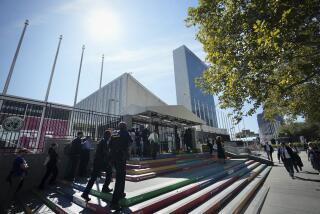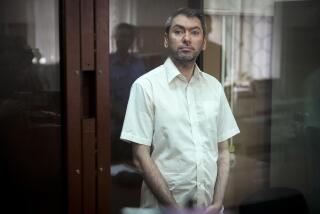Sakharov Links Human Rights to Arms Cuts
- Share via
MOSCOW — Nobel laureate Andrei D. Sakharov, once an outcast in Kremlin eyes, appeared at a semiofficial international peace forum Saturday and said more progress in human rights is essential to nuclear arms reduction.
The dissident physicist called for freedom of speech, travel and emigration in a 10-minute talk to Soviet and foreign delegates attending a three-day meeting on ways to assure survival in the nuclear age.
He said expansion of civil liberties in the Soviet Union is essential to build trust that is necessary before Soviet-American nuclear arms agreements can be negotiated. But he also praised Soviet leader Mikhail S. Gorbachev for advocating greater openness and releasing some political prisoners.
Warmly Received
Sakharov, who was released from seven years of exile in the closed city of Gorky less than two months ago, was received warmly by Soviet and foreign scientists at a round-table discussion of ways to achieve a nuclear-free world.
He spoke at a closed session, but other participants relayed his remarks to reporters.
Emerging from the meeting, Sakharov said, “Like all people on Earth, I just want peace more than anything and want there to be no nuclear danger.” He declined to elaborate, saying that he would appear next Tuesday at a news conference summing up results of the forum.
More than 900 people from 80 countries began a series of meetings Saturday to discuss how mankind can survive in the nuclear age. Gorbachev plans to address them Monday during a session in the Kremlin.
Hollywood celebrities, well-known writers, musicians, doctors, business executives, scientists and their Soviet counterparts assembled for the three-day conclave to be capped by Monday’s meeting with Gorbachev.
Actor Gregory Peck, artist and musician Yoko Ono, fashion designer Pierre Cardin and actress Claudia Cardinale came to Moscow for the session, along with economist John Kenneth Galbraith, novelist Graham Greene and Susan Eisenhower, granddaughter of former President Dwight D. Eisenhower.
Lev Sameiko, the Soviet host for the scientists’ round table, said afterward that Sakharov had endorsed big reductions in nuclear arms and said a world without nuclear weapons is possible.
Sakharov Applauded Twice
Participants said Sakharov was the only speaker to be applauded twice: once after he finished his address and a second time after the chairman, Giovanni Marini-Bettalo of Italy, thanked him for joining in the peace struggle.
The controlled Soviet press has been full of stories about the peace forum and the foreign participants for the past several days.
In an unusual development, however, the official Tass news agency carried an item on Sakharov’s appearance in its English-language service.
It was only the second time that his name has been mentioned in that service after the initial report that he would be allowed to return to Moscow from Gorky, about 250 miles east of this capital.
ABM Treaty Cited
Owen Greene, a British physicist who teaches at the Open University in London, said Sakharov praised the 1972 Anti-Ballistic Missile Treaty and said it should be preserved.
But Sakharov said it would not be possible to achieve real stability in nuclear arms unless relations between Moscow and Washington are improved, Greene added.
“His criticisms (on human rights issues) were measured and absolutely up front,” Greene told reporters, but took up only a few minutes of his time.
Meantime, the discussions among the creative artists apparently were not as focused.
“I have never heard so many abstract nouns in my life,” American writer Gore Vidal said with a smile after the first session of his sector of the forum.
But Vidal voiced admiration for Gorbachev, comparing him to President Franklin D. Roosevelt as he took steps to recover from the Depression of the 1930s.
“He’s doing what FDR did--he’s improvising,” Vidal told reporters. “The only international political weather in the world is being made by Gorbachev.”
Ono, widow of Beatles star John Lennon who arrived in aviator glasses and a white mink fur coat, was a star attraction in the lobby of the Cosmos Hotel, where many forum delegates gathered.
‘It’s a Crucial Time’
“I am very excited,” she said. “It’s a crucial time in the world, and we can’t afford to be cynical.”
About 350 Soviet counterparts of the foreign guests also were taking part in the discussions. Poet Andrei Voznesensky, for example, mingled with such visiting writers as Norman Mailer and Graham Greene.
“We need not a cultural revolution but a revolution by culture,” Voznesensky said, describing an internal struggle for change in the Soviet Union pitting Gorbachev and his followers against a conservative faction that wants to preserve the status quo.
Dobrynin Present
The meeting attracted some top Kremlin officials, including Anatoly F. Dobrynin, the former Soviet ambassador to Washington who is now a Communist Party secretary in charge of foreign policy.
Leaving the session of scientists, Dobrynin brushed aside a request from American reporters for a brief interview.
“Sorry, I have to go to lunch with your (American) businessmen,” he said as he stepped into his Zil limousine to keep his next forum appointment.
More to Read
Sign up for Essential California
The most important California stories and recommendations in your inbox every morning.
You may occasionally receive promotional content from the Los Angeles Times.













